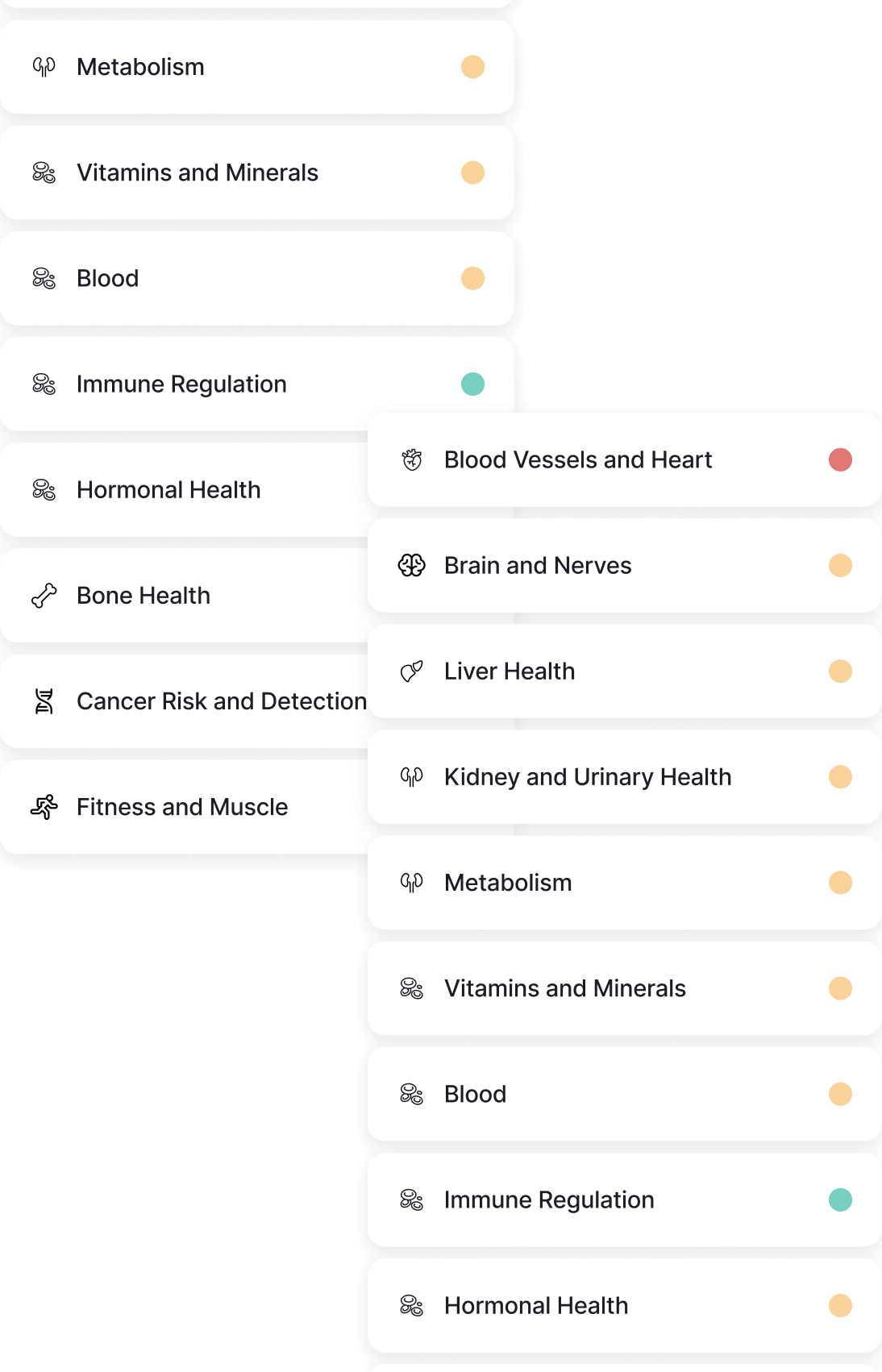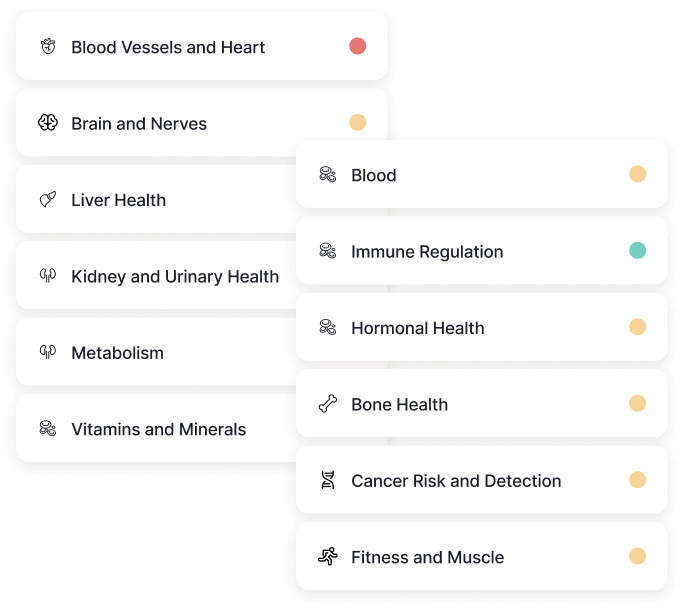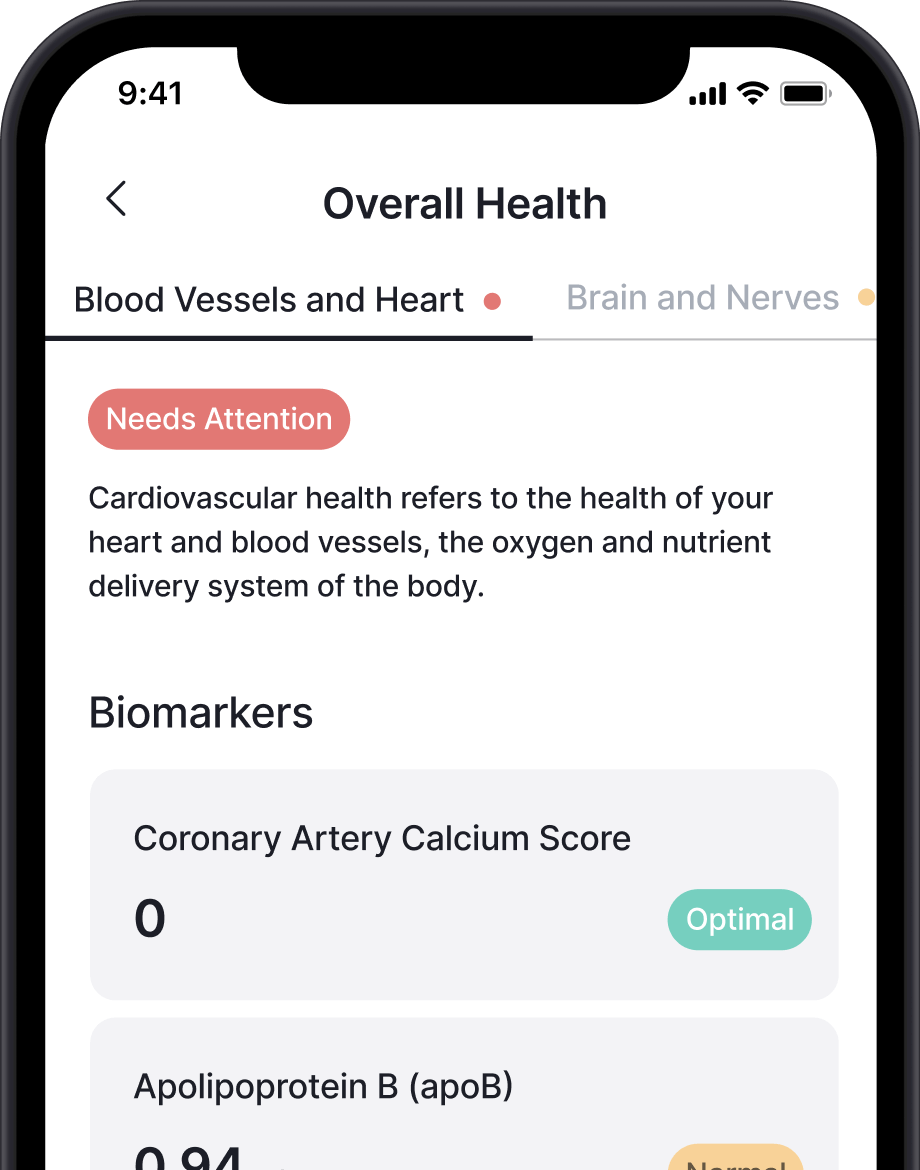Your first step to living longer and healthier
NOVI Longevity Start goes beyond standard checkups with an in-depth, data-driven evaluation of over 100 biomarkers, two doctor consultations, and actionable insights to optimize your health longevity.



Our most comprehensive health longevity screening package.
Beyond standard diagnostics, NOVI Longevity Start tests over 100 biomarkers linked to metabolic health, hormones, systemic nutrients, and health longevity. Detect early disease indicators, including cancer, heart disease, and stroke, and receive personalized health and health longevity insights.



Not your average health checkup.
NOVI Longevity Start health longevity screenings are tailored to your specific needs, establishing a health baseline. Our services include multiple consultations with specialists: an initial consultation for tailored recommendations and a post-review assessment to understand your results and be properly guided on how to move forward. Our post-assessment care offers personalized recommendations based on your results, including customized dietary, exercise, and lifestyle programs.
Results you can understand. Immediate actions you can take.
Our user-friendly dashboard provides clear insights into your screening results, prioritizing key areas for action and offering personalized recommendations and health plans.

Health longevity screening vs general health screening
Health longevity screeningOptimize your healthspan |
General health screeningOptimize your health today |
|
|---|---|---|
|
Detect diseases early
|
||
|
Identify risk of diseases
|
||
|
Track improvements over time
|
||
|
Biomarkers tested
|
100+ advanced
and standard biomarkers |
Standard
biomarkers |
|
Cardiovascular risk profile:
Lipoprotein (a), Apo B, Apo A1 |
||
|
Metabolic health profile:
Fasting insulin & glucose, HOMA-IR |
||
|
Nutritional deficiency profile:
Iron, magnesium, B12 & more |
||
|
Hormonal balance profile:
Men’s health, women’s health |
||
|
Tumour marker tests:
Ovary, prostate, pancreas, liver, colon & more |

Real insights grounded in science.
NOVI Longevity Start screening results come with evidence-based insights from leading metabolic health doctors. Rely on science-based expertise and practical actions to achieve your health goals and maximize your healthspan.
Forget annual screening.
We go beyond a single test, tracking your results over time with routine assessments. This allows you to monitor changes and make improvements to your health as you follow a tailored action plan or program.

How does it work?
Start of program
Consultation & lab tests
-
Consult a doctor for tailored recommendations (in-person or online)
-
Blood tests
-
Longevity focused measurements
Day 14 after lab tests
Review results
-
Review results in the app
-
Consultation with doctor
-
Tailored recommendations
Month 1-6
Re-testing
-
Retest selected markers to measure progress
-
Review with doctor
*Retesting components, frequency, and costs depend on patient's screening results.
Annually
Repeat once every year for selected assessment
What you get
Comprehensive Testing
We test over 100 biomarkers, including hormones, thyroid, heart, and metabolic indicators, detecting early signs of thousands of diseases.
Regular Progress Checks
Routine assessments monitor your health journey and progress. The retesting components and frequency will depend on the patient’s screening results and will be charged separately.
Lifetime Tracking
Securely track lifetime results for ongoing understanding of your body’s changes.
Pre & Post-doctor Consults
Easy-to-read personalized insights presented on an intuitive platform and supported by curated doctor recommendations.
Actionable Insights
Differentiate normal from abnormal results, track changes over time, and receive recommendations for improvement.
Invest in yourself today. Take the first step towards your longest, healthiest life at $1,099.
Comprehensive Baseline Blood Work
Our carefully curated selection of 100+ biomarkers provide valuable insights into your health status.
-
Apolipoprotein A1 (Apo A1)
Measures the level of Apo A1, a protein component of HDL cholesterol. Higher levels of Apo A1 are associated with better cardiovascular health and lower risk of heart disease. -
Apolipoprotein B (Apo B)
Apolipoprotein B is the primary protein component of low-density lipoproteins (LDL), which are often referred to as 'bad' cholesterol. Apo B is a crucial marker for assessing cardiovascular risk, as it indicates the number of atherogenic particles that can contribute to plaque buildup in arteries. Higher levels of Apo B are linked to an increased risk of atherosclerosis and cardiovascular disease. -
Apolipoprotein B/A1 Ratio
The ratio of Apo B to Apo A1 provides insight into the balance between atherogenic and anti-atherogenic particles. A higher ratio indicates increased cardiovascular risk, similar to the cholesterol/HDL ratio. -
Cholesterol / HDL Ratio
The ratio of total cholesterol to HDL cholesterol is used to assess cardiovascular risk. A higher ratio indicates a greater risk of heart disease, as it suggests a higher level of bad cholesterol relative to good cholesterol. -
HDL Cholesterol
Known as "good" cholesterol, HDL cholesterol helps remove excess cholesterol from the bloodstream, reducing the risk of heart disease. Higher HDL levels are generally associated with a lower risk of cardiovascular disease. -
High-Sensitivity C-Reactive Protein (hsCRP)
Measures the level of C-reactive protein in the blood, a marker of inflammation. Elevated hsCRP levels can indicate increased risk of cardiovascular diseases and other inflammatory conditions. -
Homocysteine
Measures the level of homocysteine in the blood, an amino acid that can indicate cardiovascular risk when elevated. Homocysteine tests help assess heart health and identify potential risk factors for cardiovascular disease, impacting overall health and well-being. -
LDL Cholesterol
Known as "bad" cholesterol, LDL cholesterol can build up in the walls of arteries, leading to atherosclerosis and increasing the risk of heart disease and stroke. Lowering LDL cholesterol levels is a key target in managing cardiovascular risk. -
Lipoprotein (a)
A type of lipoprotein that carries cholesterol in the blood. High levels of lipoprotein (a) are associated with an increased risk of atherosclerosis and cardiovascular diseases. Unlike other lipids, lipoprotein (a) levels are largely determined by genetics. -
N-terminal pro-brain natriuretic peptide (NT-proBNP)
A marker for assessing heart health, particularly related to heart function and potential heart failure risk. -
Total Cholesterol
Measures the total amount of cholesterol in the blood, including low-density lipoprotein (LDL), high-density lipoprotein (HDL), and other lipid components. Used to assess the risk of heart disease, with higher levels indicating increased risk. Balancing cholesterol levels is important for cardiovascular health. -
Triglycerides
Triglycerides are the most common type of fat in the body that stores excess energy from one's diet. An accumulation of triglycerides means there is too much fat in the blood and may indicate higher risk of a cardiac event.
-
Fasting Glucose
Measures the level of glucose in the blood after fasting, which helps assess glucose metabolism and identify conditions like diabetes or prediabetes. Fasting glucose tests help monitor blood sugar control and metabolic health, impacting overall well-being and risk for diabetes complications. -
Fasting Insulin
Measures the level of insulin in the blood after fasting, which helps assess insulin sensitivity and glucose metabolism. Fasting insulin tests help identify insulin resistance or prediabetes, impacting overall metabolic health and risk for type 2 diabetes. -
Haemoglobin A1c (HbA1c)
Measures the average blood sugar level over the past two to three months, providing insight into long-term glucose control in people with diabetes. It is used to diagnose diabetes and assess the effectiveness of diabetes management plans. -
HOMA-IR
Estimates insulin resistance using fasting glucose and insulin levels. HOMA-IR tests help assess metabolic health and identify conditions like prediabetes or metabolic syndrome, impacting overall health and risk for type 2 diabetes and cardiovascular disease. -
Phosphate
Phosphate is essential for bone health, energy metabolism, and cell function. Imbalances in phosphate levels can affect bone density, kidney function, and cardiovascular health. -
Uric Acid
Measures the level of uric acid in the blood, a waste product formed from the breakdown of purines. High levels can lead to gout and are associated with kidney stones and cardiovascular disease.
-
Albumin
Measures the level of albumin in the blood, a protein produced by the liver that helps maintain fluid balance and transport hormones, vitamins, and drugs. Low albumin levels can indicate liver disease, kidney disease, or malnutrition. -
Albumin / Globulin Ratio
The ratio of albumin to globulin helps assess liver and kidney function and overall protein balance in the body. Abnormal ratios can indicate liver disease, kidney disease, or immune disorders. -
Alkaline Phosphatase (ALP)
Measures the level of ALP, an enzyme found in the liver, bones, and other tissues. Elevated levels can indicate liver disease, bone disorders, or bile duct obstruction. -
Aspartate Transaminase (AST)
Measures the level of AST, an enzyme found in the liver and heart. Elevated AST levels can indicate liver damage or heart problems, helping diagnose conditions like hepatitis or heart attack. -
Gamma-glutamyl Transferase (GGT)
Measures the level of GGT, an enzyme found in the liver and bile ducts. Elevated GGT levels can indicate liver disease or bile duct obstruction and are often used to assess liver function and alcohol consumption. -
Globulin
Measures the level of globulin proteins in the blood, which are involved in immune function and blood clotting. Imbalances can indicate liver disease, kidney disease, or immune disorders. -
Hepatitis A Antibody (HAV Total)
Measures the presence of antibodies against hepatitis A in the blood, indicating past or current infection or immunity. HAV Total tests help assess liver health and identify potential infections, impacting overall health and well-being. -
Hepatitis B Antibody
Measures the presence of antibodies against hepatitis B surface antigen in the blood, indicating immunity to hepatitis B. Hepatitis Bs Ab tests help assess immunity status and guide vaccination strategies, impacting overall health and well-being. -
Hepatitis B Antigen
Hepatitis B surface antigen (HBsAg) is a protein on the surface of the hepatitis B virus (HBV) that indicates an active infection. Measuring HBsAg is crucial for diagnosing acute or chronic hepatitis B and assessing infectivity. -
Lactate dehydrogenase (LDH)
LDH is an enzyme that plays a role in cellular energy production. Abnormal levels may indicate tissue damage or inflammation, which can impact recovery, energy levels, and overall health. -
Total Bilirubin
Measures the level of bilirubin in the blood, a waste product from the breakdown of red blood cells. High levels can indicate liver dysfunction or hemolysis and are associated with jaundice. -
Total Protein
Measures the total amount of protein in the blood, including albumin and globulin. It reflects nutritional status and helps evaluate kidney and liver function. Total protein levels can indicate various conditions affecting protein synthesis, breakdown, and loss.
-
Adjusted Calcium
Measures the level of calcium in the blood, adjusted for albumin levels. It provides a more accurate assessment of calcium status, especially in individuals with abnormal albumin levels, to better evaluate calcium balance and associated health risks. -
Albumin - Urine (Microalbumin)
Measures the level of albumin in the urine, an indicator of kidney function. Elevated levels can suggest early kidney damage, particularly in people with diabetes or hypertension. -
Albumin/Creatinine Ratio - Urine
Measures the ratio of albumin to creatinine in urine, assessing kidney function and detecting early kidney damage. -
Bicarbonate
Measures the level of bicarbonate in the blood, an indicator of the body's acid-base balance. Abnormal levels can suggest metabolic acidosis or alkalosis, often linked to kidney or respiratory disorders. -
Calcium
Measures the level of calcium in the blood, essential for bone health, muscle function, nerve transmission, and blood clotting. Abnormal levels can indicate bone disorders, parathyroid gland dysfunction, or kidney disease. -
Chloride
Measures the level of chloride in the blood, an electrolyte that helps maintain fluid balance and acid-base balance in the body. Abnormal levels can indicate dehydration, kidney dysfunction, or acid-base imbalances. -
Creatinine
Measures the level of creatinine in the blood, a waste product produced by muscle metabolism. It is a key indicator of kidney function, with elevated levels suggesting impaired kidney function or kidney disease. -
Creatinine - Urine
Measures the level of creatinine in the urine, a waste product of muscle metabolism. It helps assess kidney function and is often used in conjunction with blood creatinine levels to evaluate kidney health. -
Estimated Glomerular Filtration Rate (eGFR)
Estimates the rate at which the kidneys filter waste from the blood, an important indicator of kidney function. A low eGFR can suggest kidney dysfunction or chronic kidney disease, requiring early intervention to prevent progression. -
Potassium
Measures the level of potassium in the blood, an electrolyte critical for nerve function, muscle contraction, and heart function. Abnormal levels can indicate kidney dysfunction, dehydration, or adrenal disorders, impacting cardiovascular health and muscle function. -
Sodium
Measures the level of sodium in the blood, an electrolyte important for fluid balance, nerve function, and muscle contractions. Abnormal sodium levels can suggest dehydration, kidney dysfunction, or adrenal gland issues, impacting overall fluid and electrolyte balance. -
Urea
Measures the level of urea in the blood, a waste product formed from protein metabolism. It helps assess kidney function and hydration status, with elevated levels indicating possible kidney dysfunction or dehydration.
-
Basophils (% and Absolute)
Measures the absolute count of basophils, a white blood cell involved in inflammatory responses and allergies. -
Eosinophils (% and Absolute)
Measures the percentage and absolute count of eosinophils, a type of white blood cell involved in allergic reactions and defense against parasitic infections. Eosinophil levels help assess allergic or parasitic conditions and guide treatment plans. -
Lymphocytes (% and Absolute)
Measures the percentage and absolute count of lymphocytes, a type of white blood cell involved in immune response to viral infections and chronic diseases. Lymphocyte levels help assess immune function and identify potential viral infections or immune disorders. -
Monocytes (% and Absolute)
Measures the percentage and absolute count of monocytes, a type of white blood cell involved in phagocytosis and immune response to infections. Monocyte levels help assess immune function and identify potential infections or inflammatory conditions. -
Neutrophils (% and Absolute)
Measures the percentage and absolute count of neutrophils, a type of white blood cell that is the first line of defense against bacterial infections. Neutrophil levels help assess immune response and identify potential infections or inflammatory conditions. -
White Blood Cell (WBC) Count
Measures the number of white blood cells in the blood, which are key components of the immune system that help fight infections and inflammation. Abnormal levels can indicate infection, inflammation, or bone marrow disorders, impacting immune response and overall health.
-
Haemoglobin
Measures the amount of hemoglobin in the blood, a protein in red blood cells responsible for carrying oxygen. Hemoglobin levels help assess oxygen transport capacity and identify conditions like anemia or polycythemia, impacting energy levels and overall health. -
Hematocrit
Measures the percentage of blood volume occupied by red blood cells. Hematocrit levels help assess oxygen-carrying capacity and identify conditions like anemia or polycythemia, impacting energy levels and overall health. -
Mean Corpuscular Haemoglobin (MCH)
Measures the average amount of hemoglobin in a single red blood cell. MCH levels help classify types of anemia and provide insight into underlying causes, impacting overall health and energy levels. -
Mean Corpuscular Haemoglobin Concentration (MCHC)
Measures the average concentration of hemoglobin in red blood cells. MCHC levels help classify types of anemia and provide insight into underlying causes, impacting overall health and energy levels. -
Mean Corpuscular Volume (MCV)
Measures the average size of red blood cells. MCV levels help classify types of anemia and provide insight into underlying causes, such as nutrient deficiencies or bone marrow disorders, impacting overall health and energy levels. -
Platelet Count
Measures the number of platelets in the blood, which are essential for blood clotting and wound healing. Abnormal platelet levels can indicate bleeding disorders, bone marrow problems, or autoimmune conditions, impacting the body's ability to prevent excessive bleeding. -
Red Cell Distribution Width (RDW)
Measures the variation in size of red blood cells. RDW levels help diagnose types of anemia and provide insight into underlying causes, impacting overall health and energy levels. -
Red Blood Cell (RBC) Count
Measures the number of red blood cells in the blood, which are responsible for carrying oxygen from the lungs to the rest of the body. RBC levels help assess oxygen-carrying capacity and identify conditions like anemia or polycythemia, impacting overall health and energy levels. -
White Blood Cell (WBC) Count
Measures the number of white blood cells in the blood, which are key components of the immune system that help fight infections and inflammation. Abnormal levels can indicate infection, inflammation, or bone marrow disorders, impacting immune response and overall health.
-
Appearance
Evaluates the visual characteristics of urine, such as color and clarity, which can provide insight into hydration status, kidney function, and potential health issues. Abnormal urine appearance can indicate dehydration, infections, or metabolic disorders, impacting overall health and well-being. -
Bacteria
Detects the presence of bacteria in urine, which can indicate bacterial infection in the urinary tract. Positive bacteria tests help assess urinary tract health and identify potential infections, impacting overall health and well-being. -
Bilirubin
Measures the level of bilirubin in the urine, which can indicate liver dysfunction or hemolysis. Detecting bilirubin in urine helps assess liver health and identify potential liver damage or disease, impacting overall health and well-being. -
Color
Evaluates the color of urine, which can provide insight into hydration status, kidney function, and potential health issues. Abnormal urine color can indicate dehydration, liver disease, or metabolic disorders, impacting overall health and well-being. -
Cotinine
Cotinine, a nicotine metabolite, indicates recent tobacco exposure. -
Epithelial Cells
Measures the presence of epithelial cells in urine, which can indicate infection, inflammation, or contamination. The presence of epithelial cells helps assess urinary tract health and identify potential issues affecting the kidneys or bladder, impacting overall health and well-being. -
Glucose
Measures the level of glucose in the urine, which can indicate elevated blood sugar levels, kidney dysfunction, or diabetes. Detecting glucose in urine helps assess blood sugar control and kidney health, impacting overall metabolic health. -
Ketones
Measures the level of ketones in the urine, which can indicate fat metabolism or uncontrolled diabetes. Detecting ketones helps assess metabolic health and identify potential issues with blood sugar control or dietary practices, impacting overall health and well-being. -
Leukocytes
Detects the presence of leukocyte esterase, an enzyme found in white blood cells, in urine. This can indicate infection or inflammation in the urinary tract or kidneys. Positive leukocyte tests help assess urinary tract health and identify potential infections, impacting overall health and well-being. -
Nitrite
Detects the presence of nitrites in urine, which can indicate bacterial infection in the urinary tract. Positive nitrite tests help assess urinary tract health and identify potential infections, impacting overall health and well-being. -
pH
Measures the acidity or alkalinity of urine, reflecting kidney function and metabolic status. Abnormal urine pH levels can indicate kidney stones, urinary tract infections, or metabolic disorders, impacting overall health and well-being. -
Protein
Measures the level of protein in the urine, which can indicate kidney dysfunction or other health conditions. Elevated urine protein levels help assess kidney health and identify potential kidney damage, impacting overall health and well-being. -
Red Blood Cell (RBC)
Measures the presence of red blood cells in urine, which can indicate bleeding or injury in the urinary tract or kidneys. Detecting RBCs in urine helps assess urinary tract health and identify potential injuries or conditions affecting the kidneys, impacting overall health and well-being. -
Specific Gravity
Measures the concentration of urine, reflecting kidney function and hydration status. Abnormal specific gravity levels can indicate dehydration, kidney dysfunction, or diabetes insipidus, impacting fluid and electrolyte balance in the body. -
White Blood Cell (WBC)
Measures the presence of white blood cells in urine, which can indicate infection or inflammation in the urinary tract or kidneys. Detecting WBCs in urine helps assess urinary tract health and identify potential infections or inflammatory conditions, impacting overall health and well-being.
-
Thyroid-Stimulating Hormone (TSH)
Measures the level of TSH in the blood, which regulates thyroid function by stimulating the production of thyroid hormones. Abnormal TSH levels can indicate thyroid dysfunction, impacting metabolism, energy levels, and overall health. -
Thyroxine (T4), Free
Measures the level of free T4, the inactive form of thyroid hormone, in the blood. Free T4 levels help assess thyroid function and identify potential thyroid disorders, impacting metabolism, energy levels, and overall health. -
Triiodothyronine (T3), Free
Measures the level of free T3, the active form of thyroid hormone, in the blood. Free T3 levels help assess thyroid function and identify potential thyroid disorders, impacting metabolism, energy levels, and overall health.
-
AFP (Liver)
Measures the level of AFP, a protein that can be elevated in certain types of cancer, including liver and testicular cancer. AFP tests help assess cancer progression, treatment response, and recurrence, impacting overall health and well-being. -
CA 19-9 (Pancreas)
Measures the level of CA 19-9, a protein often elevated in certain types of cancer, including pancreatic, gallbladder, and bile duct cancer. CA 19-9 tests help assess cancer progression, treatment response, and recurrence, impacting overall health and well-being. -
CEA (Colon)
Measures the level of CEA, a protein often elevated in certain types of cancer, including colorectal, lung, and breast cancer. CEA tests help assess cancer progression, treatment response, and recurrence, impacting overall health and well-being. -
EBV IgA (Nose)
Measures the level of IgA antibodies against Epstein-Barr virus in the blood, indicating past or current infection. EBV IgA tests help assess immune response and identify potential infections, impacting overall health and well-being. -
Hepatitis A Antibody (HAV Total)
Measures the presence of antibodies against hepatitis A in the blood, indicating past or current infection or immunity. HAV Total tests help assess liver health and identify potential infections, impacting overall health and well-being. -
Hepatitis B Antibody
Measures the presence of antibodies against hepatitis B surface antigen in the blood, indicating immunity to hepatitis B. Hepatitis Bs Ab tests help assess immunity status and guide vaccination strategies, impacting overall health and well-being. -
Hepatitis B Antigen
Hepatitis B surface antigen (HBsAg) is a protein on the surface of the hepatitis B virus (HBV) that indicates an active infection. Measuring HBsAg is crucial for diagnosing acute or chronic hepatitis B and assessing infectivity. -
PSA (Prostate) / CA 125 (Ovaries)
PSA is a protein produced by the prostate gland. Elevated PSA levels can indicate prostate cancer or other prostate conditions. PSA tests help assess prostate health, cancer progression, and treatment response, impacting overall health and well-being. CA 125 is a protein often elevated in ovarian cancer and other conditions. CA 125 tests help assess cancer progression, treatment response, and recurrence, impacting overall health and well-being. -
Stool Occult Blood
Detects hidden blood in urine or stool, which may indicate internal bleeding, kidney issues, or colon cancer.
-
B12
Measures the level of vitamin B12 in the blood, an essential nutrient for red blood cell formation, nerve function, and DNA synthesis. Vitamin B12 tests help assess nutritional status and identify deficiencies, impacting energy levels, neurological health, and overall well-being. -
Ferritin
Measures the level of ferritin, a protein that stores iron in the body. Ferritin tests help assess iron stores and diagnose conditions like iron deficiency anemia or hemochromatosis, impacting overall energy levels and health. -
Folate
Measures the level of folate (vitamin B9) in the blood, a crucial nutrient for DNA synthesis, red blood cell formation, and neural tube development during pregnancy. Folate tests help assess nutritional status and identify deficiencies, impacting overall health and fetal development during pregnancy. -
Iron
Measures the level of iron in the blood, a vital component of hemoglobin in red blood cells, essential for oxygen transport. Iron tests help assess nutritional status, identify anemia or iron overload, and impact overall energy levels and health. -
Iron Binding Capacity
Measures the blood's capacity to bind and transport iron, indicating the amount of transferrin, a protein that binds iron. This test helps assess iron status and differentiate between types of anemia, impacting overall energy levels and health. -
Iron % Saturation
Measures the percentage of transferrin that is saturated with iron, providing insight into iron availability and storage. This test helps assess iron status and guide treatment for anemia or iron overload conditions. -
Magnesium
Measures the level of magnesium in the blood, an essential mineral involved in muscle function, nerve transmission, and energy production. Magnesium tests help assess nutritional status and identify potential deficiencies, impacting overall health and well-being. -
Vitamin D
Measures the level of vitamin D in the blood, essential for bone health, immune function, and overall well-being. Adequate levels help maintain calcium and phosphate balance in the body, supporting bone density and health. -
Zinc
Measures the level of zinc in the blood, an essential mineral involved in immune function, wound healing, and DNA synthesis. Zinc tests help assess nutritional status and identify potential deficiencies, impacting overall health and well-being.
-
Follicle Stimulating Hormone (FSH)
Measures the level of FSH, a hormone involved in the regulation of reproductive processes in both men and women. FSH tests help assess fertility status, ovarian function in women, and testicular function in men, impacting overall reproductive health and hormonal balance. -
Testosterone, Total
Measures the total level of testosterone, a hormone important for male reproductive health, muscle mass, bone density, and mood regulation. Testosterone tests help assess hormonal status and identify conditions like hypogonadism or hormonal imbalances, impacting overall health and well-being in both men and women.
The Lucence INSIGHT Multicancer Early Detection (MCED) test uses a single blood test to detect multiple cancers by identifying DNA fragments shed by cancer cells into the bloodstream.
The LucenceINSIGHT 5 test checks for 5 different types of cancer, including:
-
Thyroid cancer
-
Lung cancer
-
Liver cancer
-
Pancreatic cancer
-
Colorectal cancer
- EBV IgA
- CEA
- AFP
- CA 19-9
- PSA / CA 125
- Fasting Insulin
- Fasting Glucose
- HOMA-IR
- Homocysteine
Frequently Asked Questions
-
NOVI Longevity Start covers a comprehensive range of lab tests that go beyond what are typically found in standard health screening packages.
NOVI Longevity Start also tests across 100+ biomarkers related to metabolic health, hormones, and systemic nutrients as well as longevity measures. With these, you can uncover early indicators of diseases including cancer, heart disease, and stroke and get a precise indication of where you are on your journey to optimal health.
-
Health longevity-focused measurements are health metrics and biomarkers that provide insights into your potential lifespan and overall health quality.
-
Our comprehensive blood test and diagnostic covers 100+ biomarkers related to metabolic health, hormones, and systemic nutrients as well as longevity measures.
-
NOVI Longevity Start is designed for individuals of all backgrounds and health profiles who want to invest in understanding and tracking their health over time. This proactive approach to long-term health benefits everyone. Establishing your baseline with a single set of test results helps you monitor your body’s trends and take control of your health's future.
-
Comprehensive testing has traditionally been challenging for patients, involving deciphering difficult PDFs, searching online for result interpretations, tracking trends manually, and dealing with unknown costs until billing. NOVI Longevity Start simplifies this process, offering transparent pricing, actionable insights, and recommended solutions from NOVI Health doctors based on your results. We also have a range of personalized programs to holistically support your health goals.
-
Your results will be available in one week, and your doctor will go over your report in detail during your review appointment. Additionally, you will be able to access your results in our mobile app after the consultation to assist you in monitoring your progress over time.
-
Yes, you will receive a doctor’s review along with your results.
-
You will have two consultations with your doctor. The first will take place during your initial visit, where your doctor will provide personalized recommendations for healthy longevity testing.
Once your results are ready, you will have a one-on-one follow-up consultation to review them in detail.
-
You may consult and review your results with one of NOVI Health’s doctors:
Dr Sue Anne Toh, Senior Consultant Specialist, Endocrinology, MA, MBBChir (University of Cambridge, UK), ABIM (Int Med, Endocrinology).
Dr Kyle Tan, Consultant Specialist, Preventive Medicine, MBBS, MPH, FAMS.
Dr Todd On, Associate Consultant, Family Physician, MBBS, GDFM, MMED (FM), MCFP (S).
Dr Yeo Junjie, Family Physician, MD, GDFM.
-
You can book an appointment for NOVI Longevity Start here.
-
Your blood test and diagnostics will be conducted at the NOVI Health clinic, located at:
160 Robinson Road #03-01
Mediplex @ SBF Center
Singapore 068914
